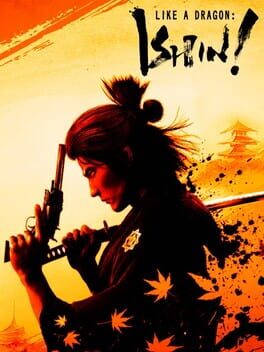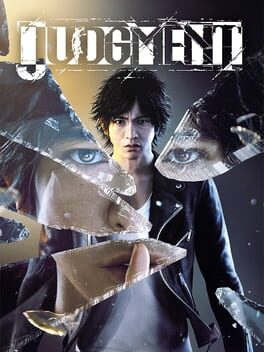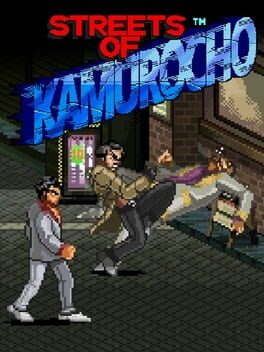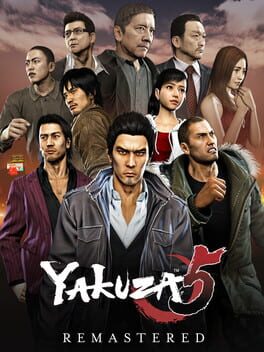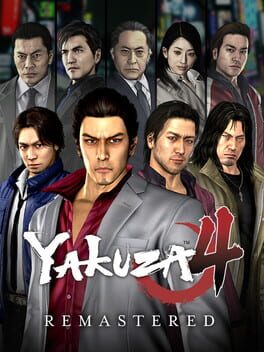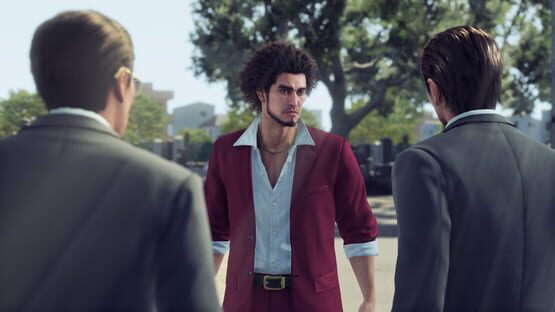

Become Ichiban Kasuga, a low-ranking yakuza grunt left on the brink of death by the man he trusted most. Take up your legendary bat and get ready to crack some underworld skulls in dynamic RPG combat set against the backdrop of modern-day Japan.
Also in series
Released on
Genres
Reviews View More
At the end of Yakuza: Like a Dragon's third chapter, protagonist Ichiban and his buddy Nanba finally score themselves a roof over their heads. After several hours of gameplay which includes scrounging around trash bins for loose change and picking up cans off the street, the pair luck into an under-the-table gig doing security at a brothel, and are permitted to live in one of the guest rooms until they can find a better place. Celebrating their victory, Ichiban and Nanba grab some cheap convenience store beer and celebrate, discussing their childhood dreams and where their lives might go from here.
As I was watching this cutscene, it occurred to me that video games, in total, do not (or cannot) construct emotional landscapes which can produce moments like this; video games do not depict the sharing of gratitude between two friends, the easy vulnerability of late night conversation, nights that stay permanently in your memories that can sustain a friendship for life. The growing pains the Like a Dragon series suffers in this transition from beat 'em up life-sim melodrama into feelgood blockbuster RPG can be (should be!) set aside to appreciate a scene like this.
While I think this game's ability to depict those scenes is special, I also think that it can't sustain that energy for its entire length. Some of my frustrations with the game come down to the fact that it can't get out of its own way, especially once the plot really gets going.
Yakuza: Like a Dragon is essentially a soft reboot/remake of the original Yakuza game on the PS2. Nearly all of this game's major story beats are pulled directly from that game, but recontextualized and reframed by Ichiban's charmingly goofy affect. That's all well and fine, but the almost pre-scripted format of the prototypical Yakuza story inevitably spins itself into an untangle-able knot that it can't escape from. While Yakuza: Like a Dragon should be fixating on the radical potential of positivity in a world seemingly designed to destroy positivity, it instead gets caught in the usual web of Yakuza intrigue the series is known for, putting the game's best qualities on the backburner so that the usual Yakuza plot beats can be fulfilled.
Because everything that occurs in Yakuza: Like a Dragon already occurred in the original Yakuza game, I'm interested in picking apart what was gained vs. what was lost from the original iteration of the story, which starred the comparatively self-serious protagonist, Kiryu Kazuma. While this game is ultimately a little less coherent and less singular as a text vs. the first game, the seeds Ryo Ga Gotoku plant here have the potential to produce something really special.
A huge amount of the changes to this game's plot revolve around the fact that Ichiban is an underdog, in contrast with Kiryu's Superman-esque noble dominance within his own narrative. Ichiban goes to prison younger, and for longer, making him more immediately sympathetic than Kiryu, who is an unknowable stoic from the jump. Other characters refer to Kiryu as an old man once he gets out of prison, whereas people refer to Ichiban as a child in a grown man's body, and the game is generally quicker to use Ichiban as a comedic punching bag than Kiryu. Kiryu's relationship with his adoptive father is mired by a major betrayal towards the end of their relationship, which is delivered like a plot twist, while Ichiban's relationship with his adoptive father is predicated entirely around what appears to be a betrayal, but is later revealed to be an act of mercy.
Many of these contrasts fundamentally alter the narrative content of the original story in an interesting way. Kiryu's story is more about his inability to truly know the people in his life, slowly learning that the value system he thought he shared with his friends and colleagues was easily destroyed by a pernicious, malignant force within the Tojo clan. The tragedy of the story is that Kiryu's love for the people who wronged him is unconditional, forcing him at odds with people who feel a deeper and more urgent sense of shame as the conflicts in the game draw on.
By contrast, Ichiban is an immediately knowable person who also correctly perceives the goodness in every character her interacts with. He is exactly the guy he says he is, and other people are ultimately who he says they are. The gist of Ichiban's story isn't that the people in Ichiban's life need to be defeated by a morally superior oppositional force so that they can be redeemed, but instead is a story about how the people in his life are already innately good, that they only need the encouragement and the opportunity to make the world a little bit better.
This is where Yakuza: Like a Dragon excels above the other Yakuza games: it's unique, in that it believes in peoples' ability as a collective moreso than in the abilities of the noble individual. While Ichiban is ultimately crowned as this game's hero, the central figure drawing everyone together, he's never elevated above the other characters in terms of importance, which is a very new, very cool tact for the series to take. Kiryu finishes his story by adopting a child to protect who can carry forward the positive values he believes in. Ichiban ends his story by enabling the friends he makes to not only better protect themselves, but to thrive in their own lives.
However, this change in direction for the series can only go so far when the plot is structurally the same as its ever been. Yakuza: Like a Dragon's biggest downfall is that it, like the original game, revolves around the machinations of a treacherous adoptive brother who acts as the game's primary antagonist. Even moreso than Kiryu's story, Ichiban's rivalry with his former brother suffers from absurd escalations within the plot, seeing Ichiban running for public office, fighting secret service agents, and doing all kinds of other bonkers stuff that totally undermines the highly personal nature of the story's first half.
The sheer Yakuza-ness of it all gets even more ridiculous by the climax which, in traditional Yakuza fashion, the antagonist is allowed to morally redeem himself only so that he can be destroyed by the forces he, himself, set into motion. In the world of the Like a Dragon series, it's better to stay completely evil rather than to make up for your evil past - you're likely to live longer that way.
Unfortunately, the new combat system also feels undercooked. I welcome the change to turn-based combat, but there's just not enough complexity to the encounters in this game to justify the sometimes grind-y nature of the higher level fights. Similarly, inserting characters who have no fighting ability into combat only further demonstrates the Yakuza/Like a Dragon Series' inability to write women - the men in this game all get fun, goofy combat classes that involve fighting or at least some manner of physical activity, whereas the first female companion uses a class in which she literally fights enemies with her purse.
Still, this is a hell of a Yakuza game. If nothing else, Ichiban's raw positive vibes gave this series a shot in the arm it sorely needed, single-handedly altering the trajectory of the Yakuza/Like a Dragon games toward a bolder and more compelling future.
As I was watching this cutscene, it occurred to me that video games, in total, do not (or cannot) construct emotional landscapes which can produce moments like this; video games do not depict the sharing of gratitude between two friends, the easy vulnerability of late night conversation, nights that stay permanently in your memories that can sustain a friendship for life. The growing pains the Like a Dragon series suffers in this transition from beat 'em up life-sim melodrama into feelgood blockbuster RPG can be (should be!) set aside to appreciate a scene like this.
While I think this game's ability to depict those scenes is special, I also think that it can't sustain that energy for its entire length. Some of my frustrations with the game come down to the fact that it can't get out of its own way, especially once the plot really gets going.
Yakuza: Like a Dragon is essentially a soft reboot/remake of the original Yakuza game on the PS2. Nearly all of this game's major story beats are pulled directly from that game, but recontextualized and reframed by Ichiban's charmingly goofy affect. That's all well and fine, but the almost pre-scripted format of the prototypical Yakuza story inevitably spins itself into an untangle-able knot that it can't escape from. While Yakuza: Like a Dragon should be fixating on the radical potential of positivity in a world seemingly designed to destroy positivity, it instead gets caught in the usual web of Yakuza intrigue the series is known for, putting the game's best qualities on the backburner so that the usual Yakuza plot beats can be fulfilled.
Because everything that occurs in Yakuza: Like a Dragon already occurred in the original Yakuza game, I'm interested in picking apart what was gained vs. what was lost from the original iteration of the story, which starred the comparatively self-serious protagonist, Kiryu Kazuma. While this game is ultimately a little less coherent and less singular as a text vs. the first game, the seeds Ryo Ga Gotoku plant here have the potential to produce something really special.
A huge amount of the changes to this game's plot revolve around the fact that Ichiban is an underdog, in contrast with Kiryu's Superman-esque noble dominance within his own narrative. Ichiban goes to prison younger, and for longer, making him more immediately sympathetic than Kiryu, who is an unknowable stoic from the jump. Other characters refer to Kiryu as an old man once he gets out of prison, whereas people refer to Ichiban as a child in a grown man's body, and the game is generally quicker to use Ichiban as a comedic punching bag than Kiryu. Kiryu's relationship with his adoptive father is mired by a major betrayal towards the end of their relationship, which is delivered like a plot twist, while Ichiban's relationship with his adoptive father is predicated entirely around what appears to be a betrayal, but is later revealed to be an act of mercy.
Many of these contrasts fundamentally alter the narrative content of the original story in an interesting way. Kiryu's story is more about his inability to truly know the people in his life, slowly learning that the value system he thought he shared with his friends and colleagues was easily destroyed by a pernicious, malignant force within the Tojo clan. The tragedy of the story is that Kiryu's love for the people who wronged him is unconditional, forcing him at odds with people who feel a deeper and more urgent sense of shame as the conflicts in the game draw on.
By contrast, Ichiban is an immediately knowable person who also correctly perceives the goodness in every character her interacts with. He is exactly the guy he says he is, and other people are ultimately who he says they are. The gist of Ichiban's story isn't that the people in Ichiban's life need to be defeated by a morally superior oppositional force so that they can be redeemed, but instead is a story about how the people in his life are already innately good, that they only need the encouragement and the opportunity to make the world a little bit better.
This is where Yakuza: Like a Dragon excels above the other Yakuza games: it's unique, in that it believes in peoples' ability as a collective moreso than in the abilities of the noble individual. While Ichiban is ultimately crowned as this game's hero, the central figure drawing everyone together, he's never elevated above the other characters in terms of importance, which is a very new, very cool tact for the series to take. Kiryu finishes his story by adopting a child to protect who can carry forward the positive values he believes in. Ichiban ends his story by enabling the friends he makes to not only better protect themselves, but to thrive in their own lives.
However, this change in direction for the series can only go so far when the plot is structurally the same as its ever been. Yakuza: Like a Dragon's biggest downfall is that it, like the original game, revolves around the machinations of a treacherous adoptive brother who acts as the game's primary antagonist. Even moreso than Kiryu's story, Ichiban's rivalry with his former brother suffers from absurd escalations within the plot, seeing Ichiban running for public office, fighting secret service agents, and doing all kinds of other bonkers stuff that totally undermines the highly personal nature of the story's first half.
The sheer Yakuza-ness of it all gets even more ridiculous by the climax which, in traditional Yakuza fashion, the antagonist is allowed to morally redeem himself only so that he can be destroyed by the forces he, himself, set into motion. In the world of the Like a Dragon series, it's better to stay completely evil rather than to make up for your evil past - you're likely to live longer that way.
Unfortunately, the new combat system also feels undercooked. I welcome the change to turn-based combat, but there's just not enough complexity to the encounters in this game to justify the sometimes grind-y nature of the higher level fights. Similarly, inserting characters who have no fighting ability into combat only further demonstrates the Yakuza/Like a Dragon Series' inability to write women - the men in this game all get fun, goofy combat classes that involve fighting or at least some manner of physical activity, whereas the first female companion uses a class in which she literally fights enemies with her purse.
Still, this is a hell of a Yakuza game. If nothing else, Ichiban's raw positive vibes gave this series a shot in the arm it sorely needed, single-handedly altering the trajectory of the Yakuza/Like a Dragon games toward a bolder and more compelling future.

